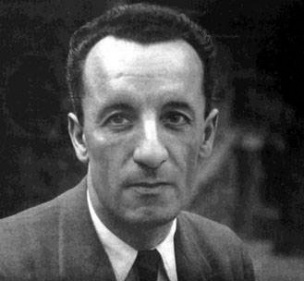Maurice Merleau Ponty
From Geography

Contents |
Background
Maurice Merleau Ponty (1908-1961) is a French phenomenological philosopher, born in Rochefort-sur-mer, France. His father died in 1913 when Maurice was only 5 years old. Maurice studied philosophy at the École Normale Supérieure, alongside with Sartre, Simone de Beauvoir, and Simone Weil. After that he taught at Chartres, University of Lyon and the Sorbonne. He was awarded the Chair of Philosophy at the Collège de France from 1952 until his death in 1961, making him the youngest person to have been elected to a Chair.
Key Contributions
Maurice Merleau Ponty could be associated with existentialism, but he is not as radical as, for example, Jean-Paul Sartre, in thinking about radical freedom and responsibility, which are important concepts in existentialism. Maurice Merleau Ponty and an-Paul Sartre were friends and co-founders editors of Les Temps. However he began having a disagreement with Sartre about his politics, which led to the publishment of the Adventures of the Dialectic in 1955. In the Adventures of the Dialectic, Ponty analysed Sastre's relationship with communism and criticizing his subject-object relations in his version of phenomenology (The European Graduate School, n.d.).
Edmund Husserl, was a great inspiration of Maurice Merleau Ponty and he attempted to invalidate tendencies in Western philosophy of empiricism and idealism and tried to emphasize human experience (The European Graduate School, n.d.). So did he embrace the fact that science and empirical data wre the path to the truth but rejected that science could discover philosofical truhts (Wyatt, 2010).
In 1945 he published his Phenomenology of Perception which was his defening work. In his work the Phenomenology of Perception he introduces the concept of the body-subject as an alternative to the Cartesian cogito. This is not the same as the traditional mind-body concept. This distinction is important because Ponty perceives the essences of the world existentially. There is a tension between bodily existence and the self as a subject of contemplation (Wyatt, 2010) . The two cannot be seen seperated from eachother but they are not the same. "You must exist physically before you can think about what it means to exist" (Wyatt, 2010).
Works of Maurice Merleau Ponty
• La Structure du comportement, Essay: 1942, 1949, rev. 6th ed. 1967 trans. The Structure of Behavior, 1963
• Les Relations avec autrui chez l’enfant, Centre de Documentation Universitaire, 1958
• La Phenomenologie de la perception, Essay: 1945, 1976 trans. The Phenomenology of Perception, 1962
• Humanisme et terreur: Essai sur le probleme communiste, Essay: 1947 trans. Humanism and Terror: An Essay on the Communist Problem, 1969
• Sens et non-sens, Essays, Articles: 1948, 1966 trans. Sense and Non-Sense, 1964
• Eloge de la philosophie: Lecon inaugural faite au College de France, le jeudi 15 janvier 1953, 1953 trans. of original In Praise of Philosophy, 1963 revised as Les Aventures de la dialectique, 1955 trans. Adventures of the Dialectic, 1973
• Signes, Essays, Articles: 1960 trans. Signs, 1964
• Le Visible et l’ invisible, 1964, trans. The Visible and the Invisible, 1968.
• Resumes de cours, Lectures: 1952—1960 trans. Themes From the Lectures at the College de France, 1970
• Perception, Structure, Language, Essays: 1981
• Le Visible et l’ invisible, 1964,
• Resumes de cours, Lectures: 1952—1960
• Perception, Structure, Language, Essays: 1981
References
- Internet Encyclopedia of Philosophy. (2005). Maurice Merleau-Ponty. Found 8 september 2011, at http://www.iep.utm.edu/merleau/
- The European Graduate School. (n.d.). Maurice Merleau-Ponty - Biography. Found 8 september 2011, at http://www.egs.edu/library/maurice-merleau-ponty/biography/
- Wyatt, C.S. (2010). Maurice Merleau-Ponty, reconnecting education and philosophy. Found 8 september 2011, at http://www.tameri.com/csw/exist/merleau.shtml
Contributors
- Page created by --JikkeVanTHof 09:39, 7 September 2011 (UTC)
- Page edited by --JornJoosten & Loek Freulich - 21:06, 8 September 2011 (UTC)
- Page edited and image inserted by Aafke Brus --AafkeBrus - 12:20, 19 October 2011 (CEST)
- Page edited by --JoepGobbens - 10:46, 23 October 2012
- Page added to Category 'Phenomenology' by Iris van der Wal - 16:01, October 25th 2012